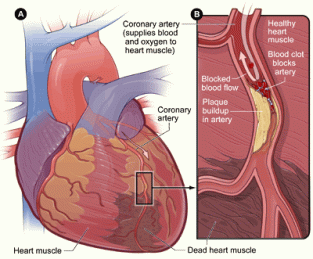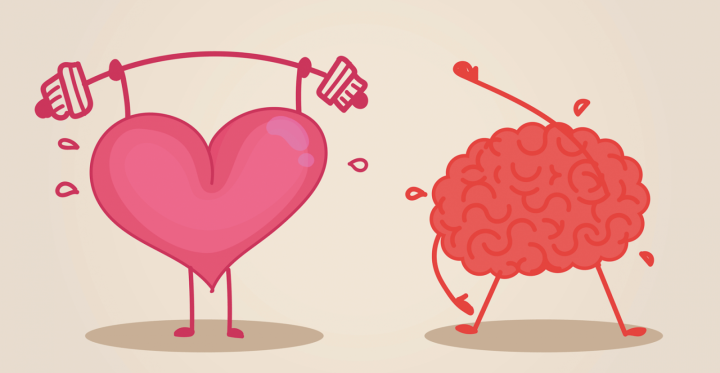Heart Attack or Stroke?
I asked a couple of people “what’s the difference between a heart attack and a stroke?” and I got responses like “a stroke is a more intense heart attack,” and “a heart attack is what causes a stroke“. Too often, I see and hear people confuse a heart attack with a stroke, thinking it’s probably the same condition with different names. Unfortunately, I’ve witnessed some so called medical doctors treat a patient having a stroke like it was a heart attack – wish I had known better then. So let’s get our facts straight right now, a heart attack and a stroke are not the same thing, they are two different conditions.
Here’s a very simple way to understand it: a heart attack affects the heart, while a stroke affects the brain. We might as well call a stroke a ‘brain attack’ to put it on the same “term” playing field with a heart attack. A person having a heart attack would suddenly have intense chest pain (on the left side of the upper chest), while a person having stroke would suddenly have an intense headache. Both conditions occur due to complications with arteries – blood vessels carrying blood rich in oxygen and nutrients to the organs.
A heart attack occurs when blood flow to a part of the heart is blocked, usually by a blood clot in the coronary arteries, causing the heart muscle to die because of a lack of oxygen and nutrients. On the other hand, a stroke a.k.a brain attack occurs when blood flow to the brain is cut off in the carotid arteries, causing cells in the brain to suffer and die – Ischemic Stroke. It can also occur when a weak blood vessel bursts, resulting in bleeding into the brain – Hemorrhagic Stroke.


Susceptible to having a heart attack or stroke?
Although heart attacks and strokes might be different conditions, they have the same risk factors – attributes, characteristics or exposure of a person that increases the likelihood of developing a disease or injury. These include age, family history, high blood pressure, high cholesterol, diabetes, smoking, being overweight, obesity, poor diet, lack of physical activity, drug and alcohol abuse.
Signs & Symptoms
Heart attacks and strokes have different warning signs – different conditions!
Signs of a heart attack include chest discomfort (pain or pressure) particularly on the left side, discomfort (pain or pressure) in other areas of the upper body such as the neck, jaw, back, stomach, shoulder or arms, sweating, nausea or vomiting, shortness of breath, and light-headedness. It is important to note that although the symptoms can appear suddenly and intensely, some people have reported that the pain or pressure can build slowly and be minor. Some people don’t even have chest pain, some may have only one symptom or a combination of symptoms. Additionally, even though chest discomfort is the most common symptom in both men and women, women can have slightly different symptoms and feel them in different places. For example, women are more likely to exhibit shortness of breath, heavy sweating and abdominal pain. In all cases, the pain could get worse with physical activity or emotional stress and doesn’t go away with rest.
Signs of a stroke include severe & sudden headache, face drooping on one side, slurred speech, tongue doesn’t work on one side, weakness or numbness in arm or leg particularly on one side of the body, trouble walking and confusion – can’t think clearly or carry out simple tasks.
By knowing these signs and acting quickly, it can save a life as extent of recovery, and even prevention of death depends on how quickly a patient is treated.
Treatments
Treatment of heart attacks usually includes medication, lifestyle changes and surgery or procedures. Medications include antiarrythmics, anticoagulants, beta-blockers, diuretics, nitroglycerin, and cholesterol-lowering medications (statins). Surgeries and procedures include atherectomy, cardioversion therapy, coronary artery bypass surgery, heart valve surgery, implantable pacemaker and mechanical assist device.
For more information: Heart/ Treatments
Treatment for stroke is a little more complicated than that of a heart attack, and there are a couple steps to it. The first hours following a stroke are very crucial, can be very scary and fast-paced. The healthcare team work quickly to figure out the type of stroke they’re dealing with (ischemic or hemorrhagic) so that can they prevent further damage to the brain.
If it’s a ischemic stroke (caused by a blood clot in the brain), it could be treated by a clot-busting drug called tPA (tissue Plasminogen Activator) which has to be given within 4.5hours after symptoms appeared, though not everyone can be treated with it. Continuous monitoring of the patient is required to make sure that the drug was effective. Those experiencing more severe strokes can be treated via endovascular thrombectomy (ET), where a stent is inserted into an artery with a thin tube and used to remove the clot.
If it’s a hemorrhagic stroke (caused by bleeding in the brain), it’s way more serous than the ischemic and can’t be treated the same way. The healthcare team determines if neurosurgery is needed to control bleeding, to fix the damaged artery or to lower the pressure in the brain. Continuous monitoring is of importance to make sure the symptoms aren’t worsening. Once a patient is stabilized, rehabilitation begins, no time to waste! This is the process that helps a patient to recover as many abilities as possible that have been lost due to the stroke.
Medication that can be prescribed after surviving a stroke include blood thinners (anticoagulants or anti-platelet medication) to prevent further blood clots, which are particularly useful after an ischemic stroke. Other medications include blood pressure lowering medications (antihypertensives), and cholesterol lowering medications.

Eye-opener; this!. Brilliant write up.
LikeLiked by 1 person
So now you can tell me the difference? 😉
LikeLike
Yes, I can. Thanks to your write-up.
LikeLiked by 1 person
Nice one aunty Wendy!! Educate the world 🙂
LikeLiked by 1 person
Thank you B! That’s the goal
LikeLike
A brilliant expose on the dangers of mistaken one for the other. Thanks, it was really an eye opener
LikeLiked by 1 person
My pleasure 😊
LikeLike
Thank you for taking the time to read it.
LikeLike
This is interesting
LikeLiked by 1 person
Thank you
LikeLike
Thanks Wendy, I feel like I have so much info in my head right now… Heart attack vs brain attack
LikeLiked by 1 person
You’re welcome Korede. I hope you got the gist and you have something to refer back to if anyone around you unfortunately suffers from one of those conditions. I appreciate you taking the time to read 😊
LikeLike
Educating people like this can save lives of those getting improper treatment in hospitals! Spreading the word
LikeLiked by 1 person
True that! Thank you!
LikeLike